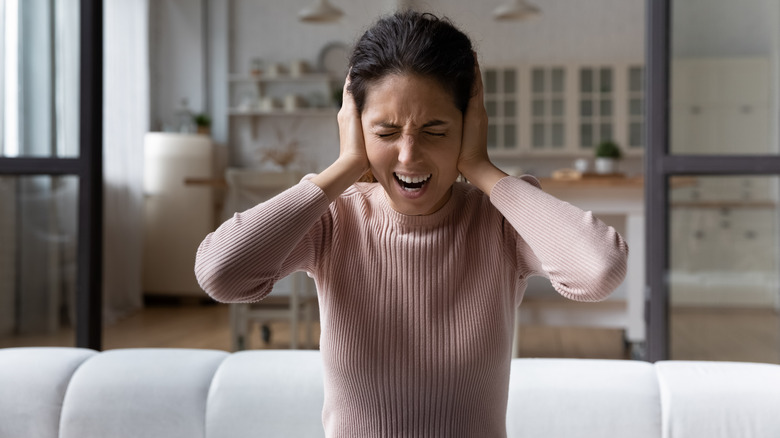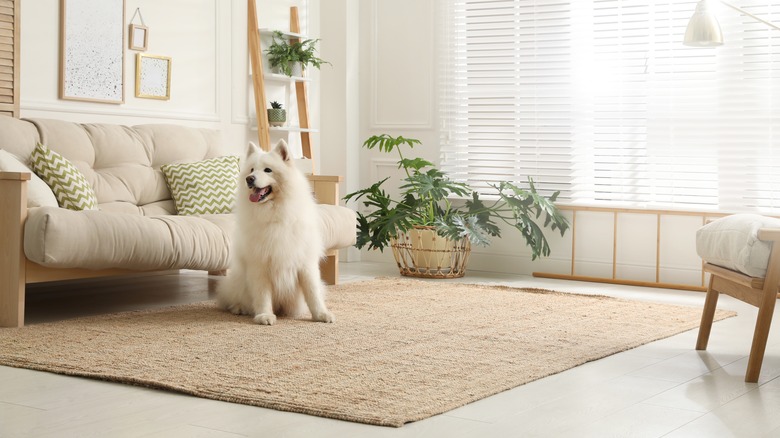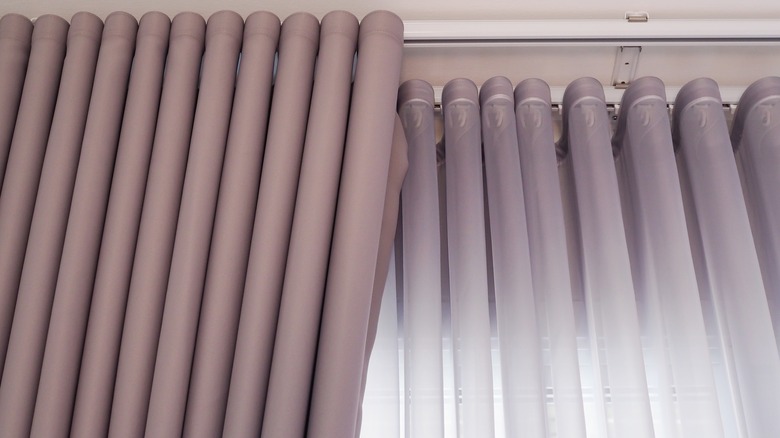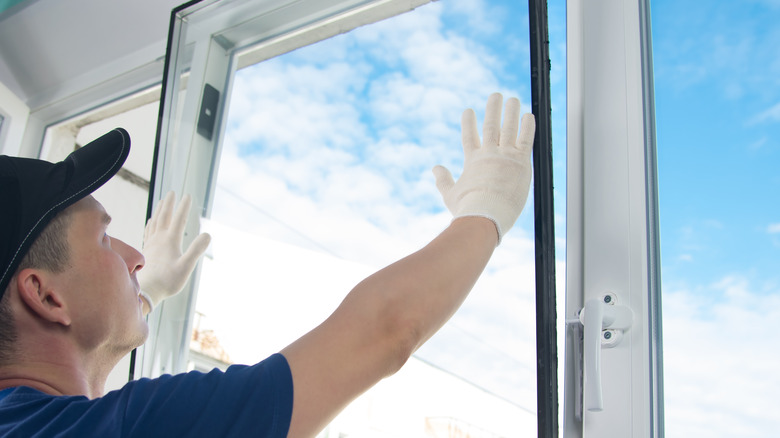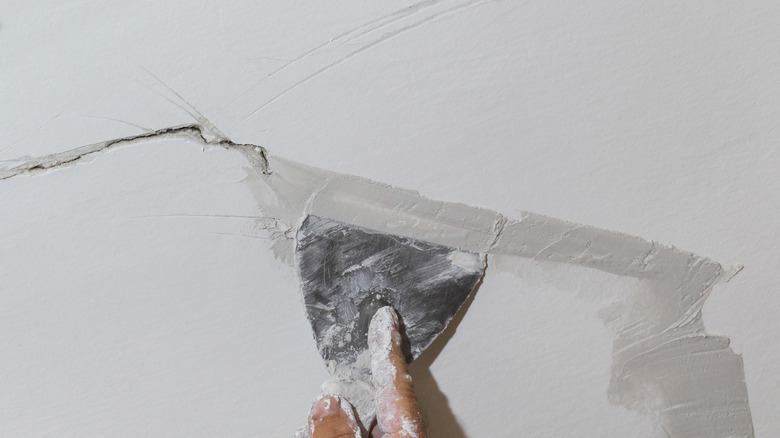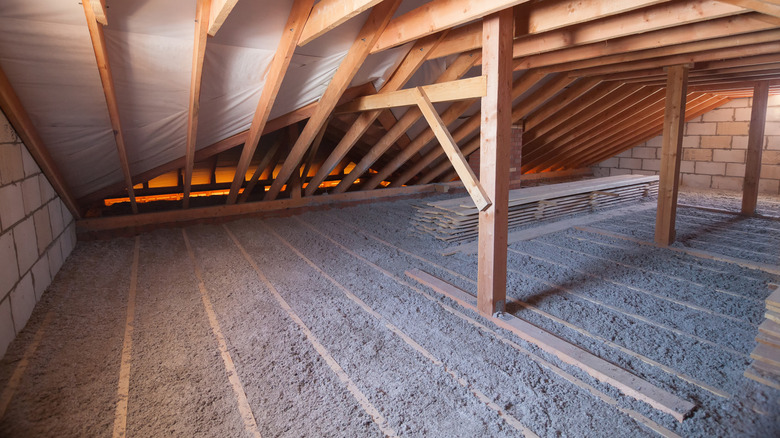5 Tips For Decreasing Noise If You Live In A Loud Area
Whether you live by a busy highway or street, in a city with an active nightlife scene, or have neighbors that like to play loud music, living in a loud area can be incredibly annoying. If you work from home, the noise can also be disruptive to your work day. If the noise persists through the night, it can also severely impede your sleep schedule. According to Sleep Foundation, disrupting your sleep can lead to short-term effects like irritability, tiredness, and decreased mental health, and in the long-term, more serious effects like high blood pressure, weight gain, heart disease, diabetes, and even cancer.
If you're finding yourself losing valuable daytime and sleep hours due to living in a noisy area, you may be incredibly frustrated and feel hopeless about what to do. Luckily, there are plenty of ways to decrease noise pollution in your house, some are more permanent upgrades, while others are simple home hacks.
1. Add more soft textures
There are two main ways to prevent bothersome noise — sound damping and sound absorption. Sound damping requires soundproofing an area, meaning sound isn't able to enter or exit the space, like in a theater. Sound absorption simply refers to the absorption of sound waves once they're in a space, explains Soundproof Central. While sound damping is more effective, sound absorption tends to be a little easier, less expensive, and doesn't require permanent installations.
Sleep Foundation recommends using soft and absorbent surfaces in your home to improve sound absorption. Consider swapping out your leather couch for one with a fabric cover, add rugs to hardwood floors, and hang curtains, tapestries, or other sound absorbent materials wherever possible. Even additional blankets and pillows will help. While this won't stop sound from coming in, it will prevent it from sounding as loud, traveling as far, and reverberating as much.
2. Sound-blocking curtains
One quick and easy way to make your loud home quieter is with sound-blocking or soundproofing curtains. According to Indow, soundproofing curtains work by absorbing sound in a space. The material of the curtains is porous, which helps them absorb sound waves. You'll usually find sound-blocking curtains in materials like polyester, suede, and velvet. They are also very long, covering all of the window down to the ground to create a seal.
Sound-blocking curtains are a great option for those who either can't or don't want to make permanent changes to their home. You can simply switch out your current curtains for truly soundproof ones, like these from Pottery Barn, which cost around $119. While they're definitely more expensive than typical curtains, the money will be well worth the peace and quiet that comes with them. As a bonus, most sound-blocking curtains are also great for regulating the temperature in a room, as well as blocking out lots of light.
3. Double glazed windows
If you're able to make more permanent upgrades, you will definitely want to consider getting double-glazed windows. According to Ecovue, loud street noise travels to your window as a pressure wave, which easily vibrates and then travels through your window and into your home. A double-glazed window has an extra pane of glass, requiring the sound waves to travel through multiple surfaces, and ultimately reducing the amount of noise that leaks into your home.
Depending on the thickness of the glass and how wide of a gap there is, double-glazed windows can reduce sound from 19% to 57%. Switching to laminated glass will make that percentage even higher. Even though it isn't a foolproof solution, double-glazed windows are an effective option. They are a little pricey, though, with Modernize saying the windows themselves can cost anywhere from $505 to $1,075, with installation costs ranging from $30 to $60 per window.
4. Fix holes and cracks
Walls are usually a lot more resistant to noise than windows, but cracks and holes can actually allow sound to travel easier, especially with thinner walls. As such, one very effective way to reduce noise in your home is to fill and repair any cracks or holes, no matter the size or severity. Not only will this help reduce noise, but it will also help with drafts and the overall integrity of your walls.
For small cracks or holes, you can simply use plaster to fill them on your own. Alternatively, Home Depot suggests that you can use a paintable acoustic sealant. Larger cracks and holes will likely require professional intervention, which can cost anywhere from $120 upwards per damaged area depending on the severity estimates Checkatrade. Pay attention to door and window frames, too, which are already vulnerable to soundwaves, and will only be more susceptible with cracks and holes.
5. Update your insulation
If you intend to make major upgrades to your house, one of the best ways you can reduce noise is by updating your insulation. According to RetroFoam of Michigan, updated insulation can decrease the noise in your home by as much as 80%. However, this is not a cheap project, costing anywhere from $8,000 to $20,000, depending on where and how you install it.
For example, new injection foam in your exterior walls, which is what will help the most with soundproofing, can cost anywhere from $4,000 to $8,000. Your attic, on the other hand, can cost anywhere from $5,000 to $10,000. If you have vinyl siding, expect your quote to be a little lower, as it can be easily removed to inject the foam and then reapplied. Exterior wall materials like brick, though, will be a little pricier since they are a little harder to work with.
